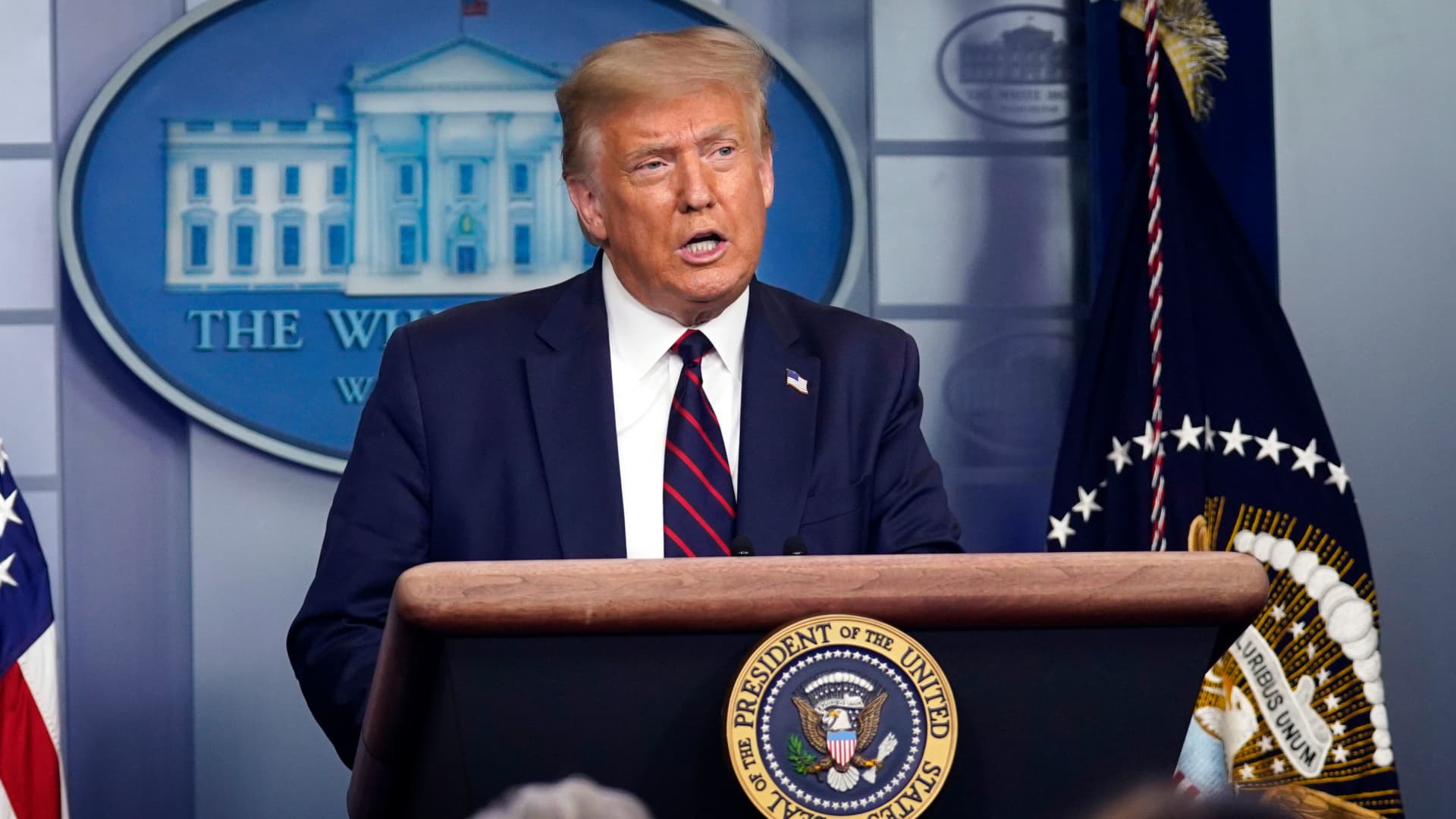Trump Media Briefing: White House Criticises Israel’s Doha Strike
In yet another dramatic turn in Middle Eastern geopolitics, the White House openly criticized Israel’s recent strike in Doha, Qatar, a move that has already triggered diplomatic shockwaves across the region and beyond. Hours after Washington’s unusually sharp rebuke, former U.S. President Donald Trump announced he would address the media, seizing the moment to position himself as both critic and alternative voice to the Biden administration’s foreign policy.
The unfolding story combines three volatile elements: America’s relationship with Israel, Qatar’s role as both a U.S. ally and regional mediator, and Trump’s instinct to dominate headlines with a mix of rhetoric and political calculation.
This article takes a detailed look at the sequence of events, the significance of the White House criticism, Trump’s political calculus, regional reactions, and the broader implications for global diplomacy.
The Strike in Doha: What Happened
The controversy erupted when Israeli forces carried out a targeted strike in Doha, reportedly aimed at eliminating figures accused of financing militant groups active in Gaza and southern Lebanon. While Israel has frequently conducted strikes in Syria, Lebanon, and Gaza, an operation in the heart of Qatar—host of U.S. military bases and key regional mediator—was extraordinary.
Key details:
Target: Israeli officials claimed the strike targeted operatives linked to Hamas’ financial networks.
Location: The attack reportedly occurred near a commercial district, raising alarm due to civilian proximity.
Casualties: While Israel insists only militants were targeted, Qatari sources reported civilian injuries, inflaming regional outrage.
For Israel, the strike was framed as a necessary pre-emptive action. For much of the world, it was viewed as reckless escalation.
White House Criticism: A Break in Tradition
The White House reaction was unusually sharp compared to its standard tone of automatic support for Israel.
Civilian Protection: The administration highlighted civilian risk, emphasizing that such actions jeopardize stability in the Gulf.
Strategic Concerns: With the U.S.
This criticism marks a rare public divergence between Washington and Tel Aviv. Historically, U.S. leaders—whether Democrat or Republican—have treaded carefully when addressing Israeli military actions.
Trump’s Response: Owning the Spotlight
Donald Trump, never one to let geopolitical drama unfold without inserting himself into the narrative, quickly announced he would hold a media briefing. Sources close to his team suggested the briefing would allow him to:
Critique Biden: Frame the administration as weak, indecisive, and failing to protect U.S. interests.
Reassert Loyalty to Israel: Reiterate his staunch pro-Israel stance, a cornerstone of his previous presidency.
Cast Himself as Diplomatic Problem-Solver: Suggest that under his leadership, such crises would never occur, invoking the Abraham Accords as evidence.
By timing his intervention immediately after the White House’s criticism, Trump seeks to draw a sharp contrast between himself and Biden—painting the current administration as turning its back on Israel while he positions himself as Israel’s steadfast ally.
Trump’s Political Calculus
Trump’s decision is more than a reflexive media grab; it is rooted in political strategy.
Appealing to Evangelical Base: Evangelical Christians, a crucial voting bloc, view unwavering support for Israel as non-negotiable. Trump’s defense of Israel shores up this support.
Targeting Jewish American Voters: While historically more aligned with Democrats, Trump aims to chip away by portraying Biden as insufficiently committed to Israel’s security.
Campaign Messaging: His rhetoric fits neatly into his “America First” framework—asserting that Biden’s foreign policy endangers American lives abroad.
In short, Trump uses the crisis to reinforce his role as Biden’s foil while solidifying key constituencies ahead of elections.
Israel’s Position
From Israel’s perspective, the strike was a calculated risk. Officials insist the operation was necessary to disrupt funding channels that sustain militant activity against Israeli civilians.
Prime Minister’s Defense: Israel’s leadership argues it cannot allow foreign capitals—even friendly ones like Doha—to serve as safe havens for groups threatening its existence.
Diplomatic Strain: At the same time, Israeli officials are acutely aware of the fallout, particularly with Qatar, which has played a role in mediating with Hamas during ceasefire negotiations.
Domestic Support: Within Israel, the strike has been popular among hardliners, reinforcing the government’s narrative of strength.
However, analysts warn that striking in Doha may backfire by isolating Israel further at a time when it already faces international scrutiny over its military operations in Gaza.
Qatar’s Reaction
Qatar, predictably, reacted with fury.
Official Condemnation: Doha described the strike as a “gross violation of sovereignty” and vowed to bring the issue to international forums, including the United Nations.
Appeal to Allies: Qatar has sought support from Gulf states and Western partners, arguing that its mediation role is undermined by Israeli aggression.
Security Concerns: Officials worry that the strike, so close to civilian areas, destabilizes Qatar’s carefully cultivated image as a secure, stable hub for diplomacy and commerce.
forces and its importance in global energy markets.
International Response
The Doha strike and the White House’s reaction reverberated globally:
European Union: Several EU leaders expressed solidarity with Qatar, emphasizing respect for sovereignty.
Turkey and Iran: Both condemned Israel’s actions harshly, framing them as proof of unchecked militarism.
Russia and China: Moscow and Beijing seized the opportunity to criticize both Israel and the U.S., portraying themselves as defenders of international law.
United Nations: Emergency discussions were called, though divisions between global powers make decisive action unlikely.
The strike risks further isolating Israel diplomatically while complicating U.S. alliances in the Gulf.
U.S.-Israel Tensions: A Rare Rift
The White House criticism and Trump’s contrasting stance expose a widening gap in how American leaders approach Israel.
Biden’s Balancing Act: Biden has tried to maintain support for Israel while responding to international pressure over humanitarian concerns.
Trump’s Simplicity: By contrast, Trump offers unconditional backing, a message far easier to sell to certain voters but potentially destabilizing in diplomacy.
Impact on Policy: The incident may push Biden to more carefully calibrate U.S. support, while Trump’s rhetoric ensures Israel knows it has an alternative ally waiting in the wings.
This divergence underscores how Israel is increasingly becoming a partisan issue in U.S. politics.
Regional Fallout
The Doha strike risks destabilizing more than just Qatar-Israel ties.
The Abraham Accords normalized relations between Israel and some Gulf states, but actions like this could strain those agreements.
Hamas and Hezbollah: Militants are likely emboldened by the backlash against Israel, using it to rally support and justify further actions.
Civilian Anxiety: In both Israel and Qatar, civilians fear the escalation of tit-for-tat violence spilling across borders.
The longer-term risk is that the Gulf becomes another theater of conflict, rather than remaining a hub of stability.
Trump’s Media Briefing: Expectations
As Trump prepares to speak, several themes are expected to dominate his remarks:
Criticism of Biden: Trump will likely accuse the White House of betraying Israel and emboldening enemies.
Reassertion of Strength: He will point to his administration’s record as one of stability, contrasting it with current instability.
Appeal to Allies: Trump may claim that only he can rebuild trust with both Israel and Gulf allies.
Domestic Politics: Expect strong nationalist rhetoric about protecting U.S. troops in Qatar and avoiding entanglements caused by “weak leadership.”
The briefing will be as much about shaping domestic narratives as it is about addressing foreign policy.
Broader Implications
For U.S. Politics
The incident sharpens foreign policy as a campaign issue. Trump benefits from drawing a contrast, while Biden faces pressure from both progressive critics skeptical of Israel and traditional allies demanding firm support.
For Israel
Israel must weigh the short-term gains of eliminating threats against the long-term risk of alienating key partners. Without U.S. diplomatic cover, its options become narrower.
For Qatar
The strike could push Qatar closer to regional rivals of Israel, undermining years of careful diplomacy. It also raises security concerns for the U.S. military presence there.
For the Global Stage
The episode highlights the fragility of global order when allies clash and adversaries exploit divisions. Russia and China, in particular, stand to gain by presenting themselves as alternatives to Western “double standards.”
Conclusion
The Doha strike and its fallout demonstrate the increasingly complex web of alliances, rivalries, and political agendas shaping the Middle East. The White House’s rare public criticism of Israel marks a significant moment in U.S.-Israel relations, one that could reshape diplomacy in the Gulf.
Meanwhile, Donald Trump’s decision to hold a media briefing illustrates how domestic politics and international crises intersect. By positioning himself as Israel’s unwavering ally and Biden’s sharpest critic, Trump is not just responding to events—he is seeking to redefine them in his own image.
As the region braces for the consequences, one thing is clear: the clash over Israel’s Doha strike is not just about one attack. It is about sovereignty, diplomacy, great power competition, and the future direction of U.S. foreign policy.



